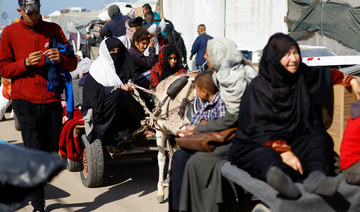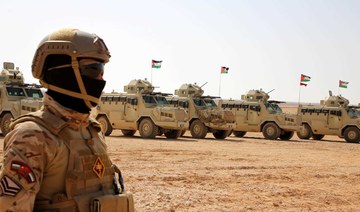UNITED NATIONS: The UN chief warned Israel on Tuesday that Prime Minister Benjamin Netanyahu ‘s rejection of a two-state solution will indefinitely prolong a conflict that is threatening global peace and emboldening extremists everywhere.
In his toughest language yet on the Israeli-Hamas war, Secretary-General Antonio Guterres told a ministerial meeting of the UN Security Council that “the right of the Palestinian people to build their own fully independent state must be recognized by all, and a refusal to accept the two-state solution by any party must be firmly rejected.”
The alternative of a one-state solution “with such a large number of Palestinians inside without any real sense of freedom, rights and dignity … will be inconceivable,” he said.
Guterres also warned that the risks of regional escalation of the conflict “are now becoming a reality,” pointing to Lebanon, Yemen, Syria, Iraq and Pakistan. He urged all parties “to step back from the brink and to consider the horrendous costs” of a wider war.
Netanyahu’s rejection of a Palestinian state in any postwar scenario opened a wide rift with Israel’s closest ally, the US, which says the war must lead to negotiations for a two-state solution where Israel and the Palestinians can live side-by-side in peace. That goal is supported by countries around the world, as ministers and ambassadors reiterated Tuesday.
Saudi Deputy Minister of Foreign Affairs Waleed Elkhereiji told the council: “How can this tragedy continue with no serious action to bring an end to it and with no measures to halt the carnage and collective punishment against defenseless civilians in Gaza.”
Elkhereiji told the council that a lasting solution was the only way to ensure peace and regional stability.
“Any measure for regional security or to prevent threats cannot replace a resolution of the root causes the crisis in Palestine and finding a lasting solution,” he said. “You must act to ensure an immediate ceasefire and to restore peace to alleviate suffering and to allow the Palestinian people to safeguard their dignity and their legitimate rights.”
Opinion
This section contains relevant reference points, placed in (Opinion field)
“This peace which we so desire must go via a credible, irreversible path toward creating an independent Palestine state which safeguards the dignity of the Palestinian people, allowing for their coexistence and common security as well as for stability and development for all.”
The health ministry said that at least 25,000 civilians have been killed, mostly children and women, as Israel continues to pound the densely populated Gaza Strip in its campaign to eradicate Hamas, after the group attacked settlements near the enclave killing 1,200.
“We categorically reject violations of international humanitarian law by any parties, in any circumstances. We condemn targeting of civilians and call upon this Council to adopt firm position to oblige Israel to respect international law and bring an end to this suffering.”
He also warned of the dangers of military escalation in the region and its impact of security and stability.
“Military operations in the Red Sea and the Yemeni republic are a source of concern. The necessary measure therefore must be taken to contain incidences and repercussions of this crisis, which is affecting neighboring countries and international peace and security.”
United Arab Emirates’ ambassador to the UN, Lana Zaki Nusseibeh, told the council: “We need an immediate humanitarian ceasefire in Gaza. The overwhelming majority of the international community has called for this, repeatedly. It is time for the minority view to stop obstructing it from happening.”
She added: “The humanitarian imperative at this moment must be our top priority, in addition to the ceasefire, so that life-saving aid can enter at scale, and hostages can be allowed out and returned to their families safely.”
Pakistan said Israel’s actions in Gaza were genocidal and called for greater recognition of Palestine.
“It is time to admit Palestine as a full member of the United Nations,” said. Munir Akram, Pakistan’s permanent representative to the UN.
Uzra Zeya, the State Department’s under secretary for civilian security, democracy and human rights, told the council, “A key component of US diplomacy is to pursue a pathway both to a Palestinian state and normalization and integration between Israel and other regional states.”
“The goal is a future where Gaza is never again used as a platform for terror, and a future where Palestinians have a state of their own,” she said, reiterating the Biden administration’s call on Israel to do more to protect Palestinian civilians.
Russia’s Foreign Minister Sergey Lavrov countered that American diplomacy “oscillates between vetoing resolutions about the ceasefire and at the same time calling for a reduction in the intensity of hostilities in Gaza.”
“Without a doubt this serves as carte blanche for the ongoing collective punishment of Palestinians,” Lavrov told the council.
Secretary-general Guterres repeated his longstanding call for a humanitarian ceasefire — an appeal with overwhelming global support.
But Israel’s UN Ambassador Gilad Erdan again rejected a ceasefire, saying Hamas, which carried out a brutal attack on southern Israel on Oct. 7, is committed to attacking again and destroying Israel, and a halt to fighting will only allow the militants “to regroup and rearm.”
He urged the Security Council to “eliminate the root” of the conflict, which he said was Iran.
Erdan strongly criticized the presence of Iran’s foreign minister at the council meeting, saying the country provides weapons to Hamas, to Hezbollah fighters in Lebanon and Houthi militants in Yemen, “and soon these acts will be carried out under a nuclear umbrella” and “Iran’s terror will reach all of you.”
Iran has long denied seeking nuclear weapons and insists its nuclear program is entirely for peaceful purposes. But the UN nuclear watchdog has warned that Iran has enough enriched uranium for nuclear bombs if it chose to build them.
Iran’s Foreign Minister Hossein Amirabdollahian didn’t mention its nuclear program, but he warned Israel that it would not destroy Hamas, its stated goal.
“The killing of civilians in Gaza and the West Bank cannot continue on to the so-called total destruction of Hamas, because that time will never come,” he said. “Stopping the genocide in Gaza is the main key to security in the region.”
Riyad Al-Maliki, the Palestinian foreign minister, said Israel is carrying out “the most savage bombing campaign” since World War II, which is leading to famine and the massive displacement of civilians. “This is an assault of atrocities,” which has destroyed countless innocent lives, he said.
Al-Maliki said Israel doesn’t see the Palestinians as a people and a “political reality to coexist with, but as a demographic threat to get rid of through death, displacement or subjugation.” He said those are the choices Israel has offered Palestinians, calling them tantamount to “genocide, ethnic cleansing or apartheid.”
Al-Maliki said there are only two future paths: One starts with Palestinian freedom and leads to Mideast peace and security, and the other denies freedom and “dooms our region to further bloodshed and endless conflict.”
France’s new foreign minister, Stéphane Séjourné, whose country holds the council presidency this month, presided at the meeting and warned that “a regional conflagration is real.”
He said the world should unite and deliver different messages to the warring parties.
Israel must be told that “there must be a Palestinian state” and that violence against Palestinians, including by West Bank settlers, must end, Séjourné said. And the Palestinians must be told that “There can be no ambiguity regarding Israel’s right to live in peace and security, and to exercise its right to self-defense against terrorism.”
But Turkiye’s Foreign Minister Hakan Fidan said the argument that the war is about providing security for Israel “is far from being convincing.” He said supporters of this view never talk about the Palestinians’ right to security and self-defense.
Jordan’s Foreign Minister Ayman Safadi said the “ideology of hate embraced openly by Israeli ministers is normalizing the mass murder of Palestinians” and urged the council to stop it with a binding resolution.
Israel must be held accountable for war crimes and for blocking a Palestinian state, Safadi said. “The future of the region cannot be taken hostage to the political ambitions and the radical agendas of Israeli extremists who described the Palestinians as human animals, unworthy of life, who enable settler terrorism against Palestinian people.”



























